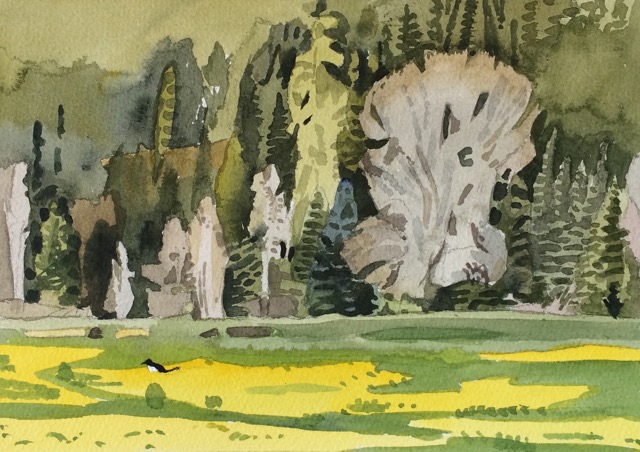
19 May Telluride Institute: Valley Floor Living Classroom
The Telluride Institute’s summer series, “Valley Floor Living Classroom,” returns in 2018 and is designed to introduce participants to some of Telluride’s most outstanding natural assets and provide an opportunity to engage in firsthand science related to water quality and aquatic life, ancient fens, and the region’s diverse wildlife. Classes will be offered each month throughout the summer season. A full schedule and details on where to meet each session are available at www.tellurideinstitute.org.
The May 22nd tour starts at 9 a.m. at the San Miguel Country Store (Shell Station), located at 1982 CO Highway 145. Participants should pack a sack lunch and plan for light to moderate hiking. The tour finishes at about 1 p.m.

Elk on Valley Floor, courtesy Amy Levek.
High school students and adults are invited to participate in hands-on science on the Valley Floor through a free and open-to-the-public series of classes kicking off Tuesday, May 22: Valley Floor Living Classroom.
The summer-long series offers in-depth, educational tours of the natural features of the Valley Floor and provides an opportunity for participants to engage in real citizen science.
The Telluride Institute first hosted the Valley Floor Living Classroom Preview in 2015.
“There is a demand for adult-level environmental education in Telluride. After a successful run a few years ago, we are excited to bring back the series for 2018. The Valley Floor provides an excellent setting to explore the region’s many natural assets,” said Elizabeth Stuffings, instructor, Telluride Institute’s Watershed Education Program.
“The program is much more than just a field trip experience. It is an avenue for community members to learn how scientists monitor and evaluate our landscape and, in turn, think about how they can assist these scientific pursuits. We hope participants leave the classes inspired to engage in citizen science and help monitor the region’s forests, wildlife, and streams throughout the entire year,” Stuffings continued.
The 2018 season explores Telluride’s changing forests, a timely topic given this year’s exceptional drought conditions.
Featuring Dr. Jason Sibold, a biogeographer from Colorado State University, participants will get out amongst the trees and learn about the natural history of regional forests, discover how climate change is currently impacting local trees, and find out what the future holds for our forested landscapes.
In addition, attendees will help Dr. Sibold install a permanent monitoring plot with temperature sensors. The data from the plot will be used by scientists and land managers to better understand how changing weather conditions are affecting the health of local forests.
Dr. Sibold has been involved in multiple forest-health monitoring initiatives in the Telluride region. Most recently, he has acted as the lead researcher for the Upper San Miguel Basin Forest Health Landscape Assessment.
The Landscape Assessment is an ongoing stakeholder-driven effort to better understand the potential changes to Telluride’s forests and has resulted in a comprehensive map of current and projected forest conditions in the upper San Miguel Watershed.
An interactive version of the maps was created to provide a visual story of potential forest adaptation in the context of climate change. These Forest in Flux story maps can be viewed at San Miguel County’s Forest Health webpage here.
The Living Classroom session includes how beetle kill, disease, wildfire and climate change have the potential to significantly alter the nature of Telluride’s forest landscape, sometimes rapidly.
Naturally occurring bark beetle and disease infestations, and wildfire can be ecologically beneficial processes. However, they can also have a wide variety of negative impacts on communities.
In addition, fire suppression and recent epidemic disease and beetle outbreaks are creating new threats and ecological outcomes.
Attendees should come away from the trip having a better understanding of how these processes and potential outcomes could impact their communities and how to prepare for such changes.


Sorry, the comment form is closed at this time.